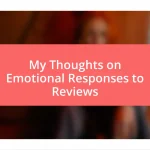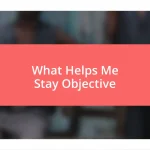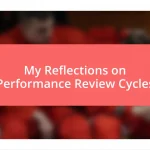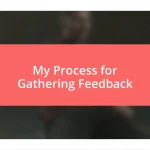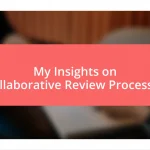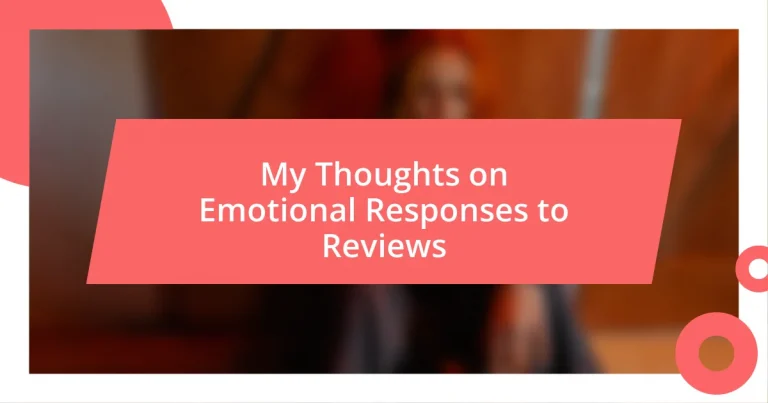Key takeaways:
- Emotional responses to reviews vary among individuals, influenced by personal connections, values, and experiences, which can lead to feelings of joy, self-doubt, or defensiveness.
- Receiving feedback, whether positive or negative, significantly impacts self-esteem and identity, making it essential to reflect on these emotions for personal growth.
- Coping strategies for negative feedback, such as taking a step back, seeking perspective, and reframing critiques, can transform criticism into constructive opportunities for resilience and improvement.
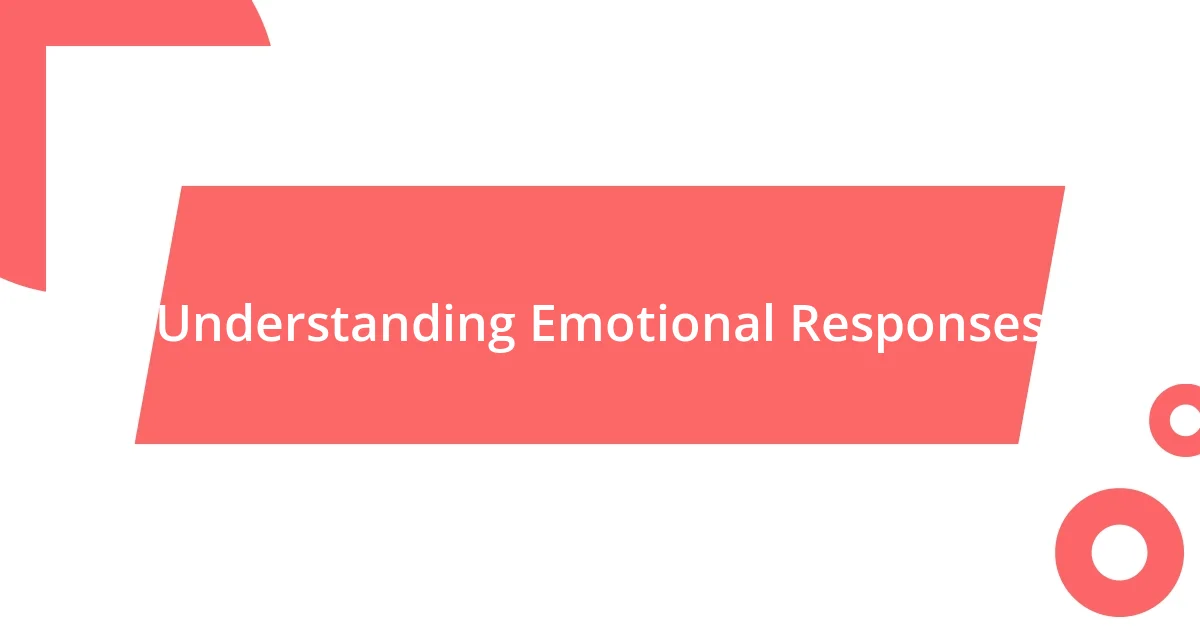
Understanding Emotional Responses
Emotional responses are fascinating because they can vary greatly between individuals, even when faced with the same stimulus, like a review. I remember reading a glowing review about my favorite book, which filled me with joy, while a negative critique of the same book left some of my friends feeling defensive. Why do we react differently to the same feedback? It often boils down to our personal connections, values, and experiences.
When I think about emotional responses to reviews, I sometimes find myself reflecting on my past experiences. For instance, receiving criticism on my writing can sting. It’s interesting how that moment of vulnerability can provoke feelings of self-doubt and anger. However, I’ve learned that those emotions often serve a purpose—they highlight areas where I can grow and improve.
There’s also the aspect of expectation that influences our reactions. I often wonder how other creators feel when their work doesn’t resonate the way they hoped. Personally, I recall a time when I poured my heart into a project, only to receive mixed feedback. Initially, my heart sank, but later, I realized that such responses are a natural part of sharing creative work. It’s a reminder that emotional reactions are complex and can lead us to deeper insights about ourselves and our audience.
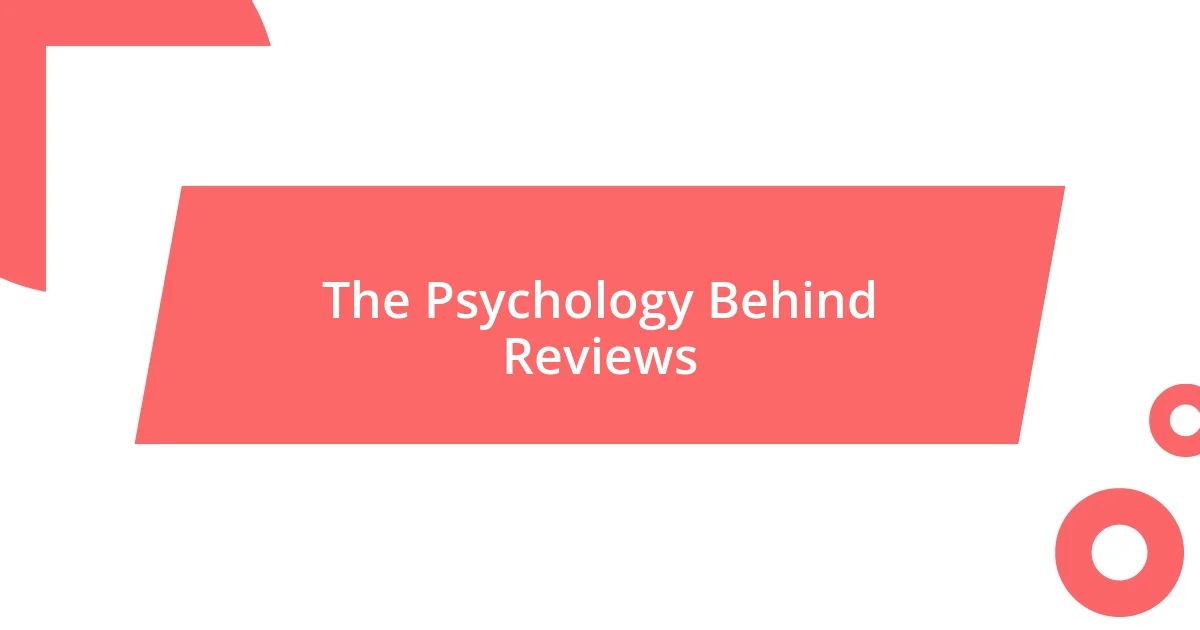
The Psychology Behind Reviews
The psychology behind reviews reveals much about human nature and our emotional landscape. When I look at reviews, I often notice they tap into our insecurities and desires. A friend’s harsh critique of a restaurant we loved left me feeling puzzled, as it stirred feelings of embarrassment for my taste. It made me realize that a single review can challenge our identity and the connections we have with others over shared experiences.
- Reviews can trigger feelings of validation or rejection.
- They reflect our personal values and expectations.
- Emotional responses can reveal deep-seated insecurities.
- The context in which we read reviews influences our reactions.
- Our past experiences shape how we interpret feedback.
I remember a time when a glowing review of my artwork brought me immense pride, yet it was also shadowed by the fear of not living up to that standard in future endeavors. This duality becomes a fascinating aspect of our psychological response; the joy of praise coexists with the anxiety of future judgment. It’s remarkable how our emotional reactions not only inform our self-perception but also deepen our understanding of the intricate dance between feedback and identity.
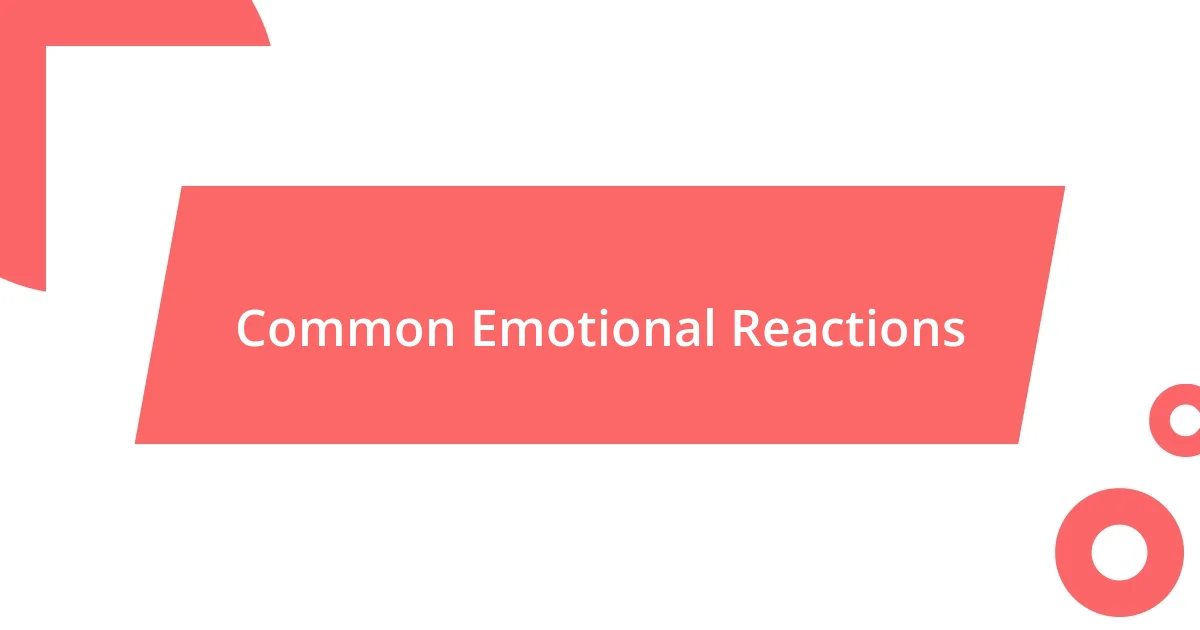
Common Emotional Reactions
When it comes to common emotional reactions to reviews, I find that feelings can often fall into starkly different categories. For instance, positive reviews can evoke a surge of happiness, reinforcing a sense of accomplishment. I remember when I received a heartfelt review on my podcast; it felt like a warm embrace, reminding me why I started creating in the first place.
Conversely, negative feedback can lead to a wave of discouragement. I recall a particularly rough critique on a blog post I had spent weeks crafting. The moment I read it, I felt a sharp jab of self-doubt, questioning my abilities and the value of my work. These contrasts in emotional responses are telling and show just how deeply intertwined our self-worth is with the feedback we receive.
Another common reaction I observe is the feeling of defensiveness. When our creations are critiqued, it can sometimes feel like a personal attack. I experienced this firsthand during a group critique where my project received more criticism than praise. As I listened, my heart raced, and I felt the urge to defend my choices instead of embracing the feedback. This illustrates how emotional responses can often cloud our ability to objectively assess criticism.
| Type of Reaction | Example Emotion |
|---|---|
| Positive Reviews | Joy or Pride |
| Negative Reviews | Discouragement or Self-Doubt |
| Critical Feedback | Defensiveness |
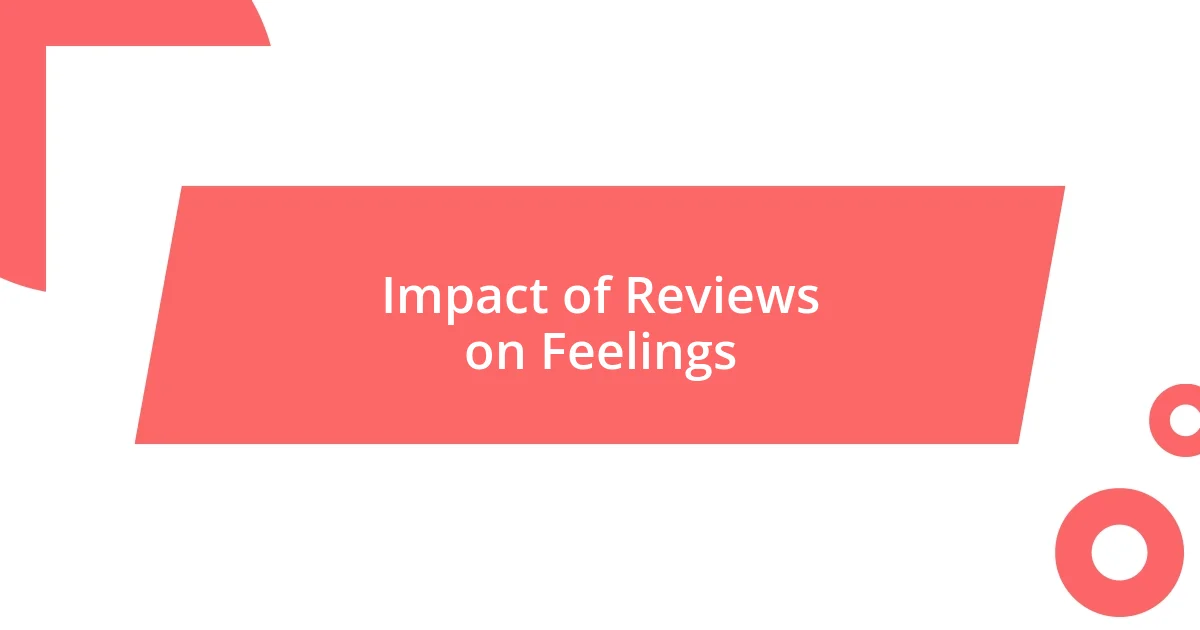
Impact of Reviews on Feelings
Receiving reviews can stir a whirlpool of emotions. I recall a time when I bravely shared a creative project and eagerly awaited feedback. When the reviews poured in, I was surprised by how a few words — positive or negative — could send me soaring or crashing. Have you ever felt that stark contrast, where a simple review could light up your day or leave you second-guessing everything you’ve done?
I’ve also noticed that the context in which we receive these reviews plays a significant role in shaping our feelings. There was a moment when a friend casually dismissed my latest article, and it stung far more than I expected. It was like a direct hit to my self-esteem. At that moment, I realized that external validation can either uplift or chip away at our self-worth, depending on who delivers the message and how we perceive it.
In reflecting on these experiences, I’ve come to see emotional responses to reviews as mirrors. They not only reveal our current state of mind but also illuminate deeper truths about ourselves. Have you ever thought about how a critique might echo insecurities you weren’t even aware of? I can’t help but ponder how our emotional reactions can guide us in understanding not just our work, but also the core of who we are as creators.
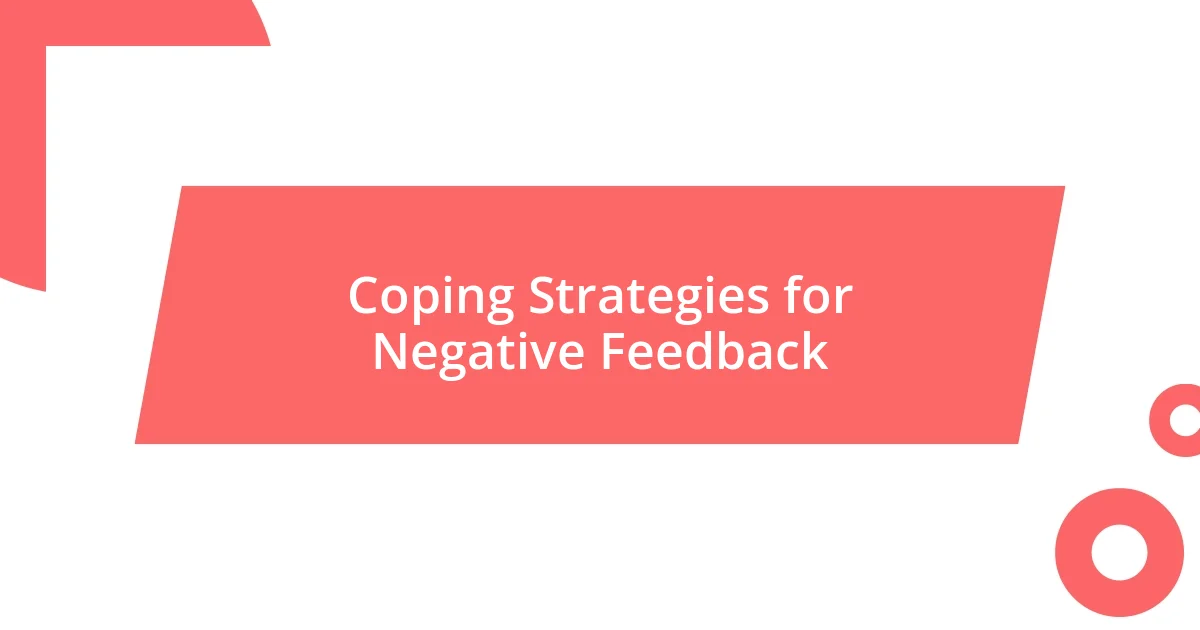
Coping Strategies for Negative Feedback
When faced with negative feedback, one effective coping strategy I’ve found is to take a step back and breathe. Recently, I received a review that cut deep; rather than reacting immediately, I took a day to digest it. This pause allowed me to sift through the emotions, helping me differentiate between the critique and my self-worth. Doesn’t giving ourselves that space often yield clearer insights?
Another approach that works wonders for me is seeking perspective from trusted friends or mentors. After a stinging critique on a project, I reached out to a colleague who had experience in the field. They offered a balanced viewpoint, reminding me that everyone receives feedback, and it’s an opportunity for growth. Isn’t it fascinating how a fresh perspective can transform our view of criticism into a stepping stone rather than a stumbling block?
Lastly, I’ve learned the importance of reframing negative feedback as constructive criticism. I remember a time when I was devastated by a review that seemed harsh. Instead of focusing on the pain, I refocused my energy on extracting actionable points from it. Have you ever considered that each piece of feedback could be a roadmap guiding you toward improvement? This shift in mindset has allowed me to view critiques as tools for my evolution rather than threats to my identity.
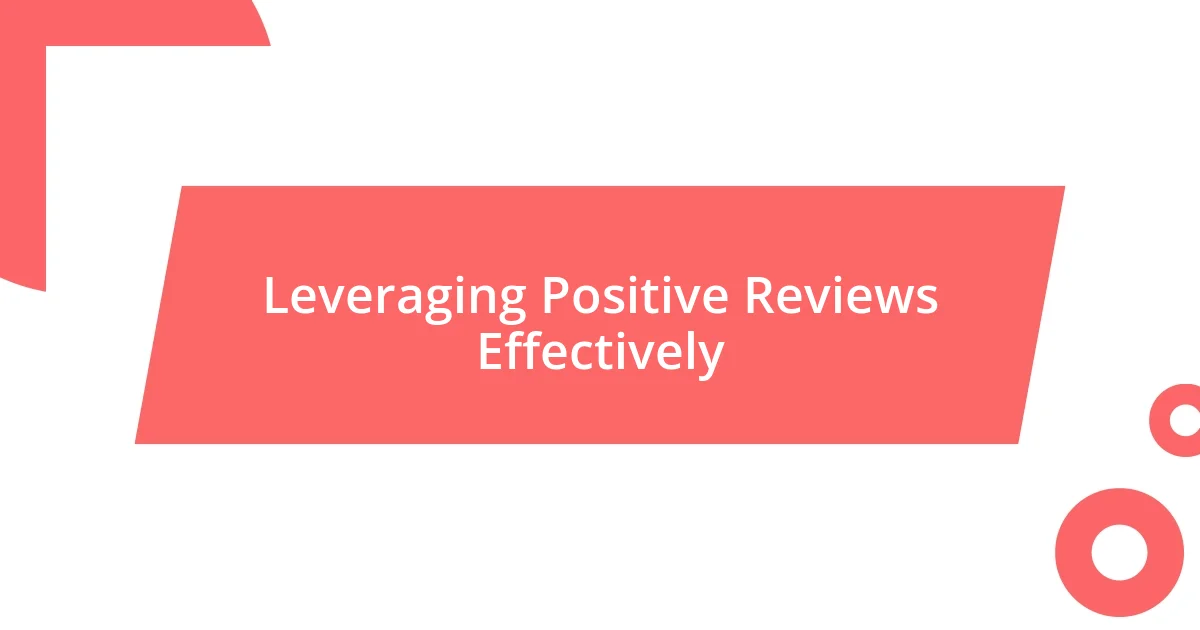
Leveraging Positive Reviews Effectively
Imagine encountering a glowing review that celebrates your work in ways you hadn’t anticipated. I remember receiving an email from a reader who shared how my article inspired them to pursue their passion for writing. That feeling? It was electric. Positive reviews like that not only boost my morale but also serve as powerful motivation to keep creating. Have you ever experienced a moment when a few encouraging words from someone made you feel seen and valued?
Harnessing positive reviews effectively goes beyond just relishing them. I’ve found that sharing these endorsements on social media or my portfolio can create a ripple effect. For instance, when I showcased a particularly heartwarming testimonial from a happy client, the engagement skyrocketed. It resonated with others who were on the fence about working with me. Isn’t it intriguing how showcasing genuine praise can act as social proof, establishing credibility and attracting new opportunities?
Additionally, I’ve taken to heart the idea of integrating positive feedback into my personal and professional narrative. When crafting my next project, I often reflect on the praises I’ve received. Recently, I created a vision board inspired by glowing reviews, reminding me of my journey and potential. Have you thought about how these happy moments can fuel future endeavors? By continuously revisiting those affirmations, I find myself both grounded and inspired to venture into new creative territories.
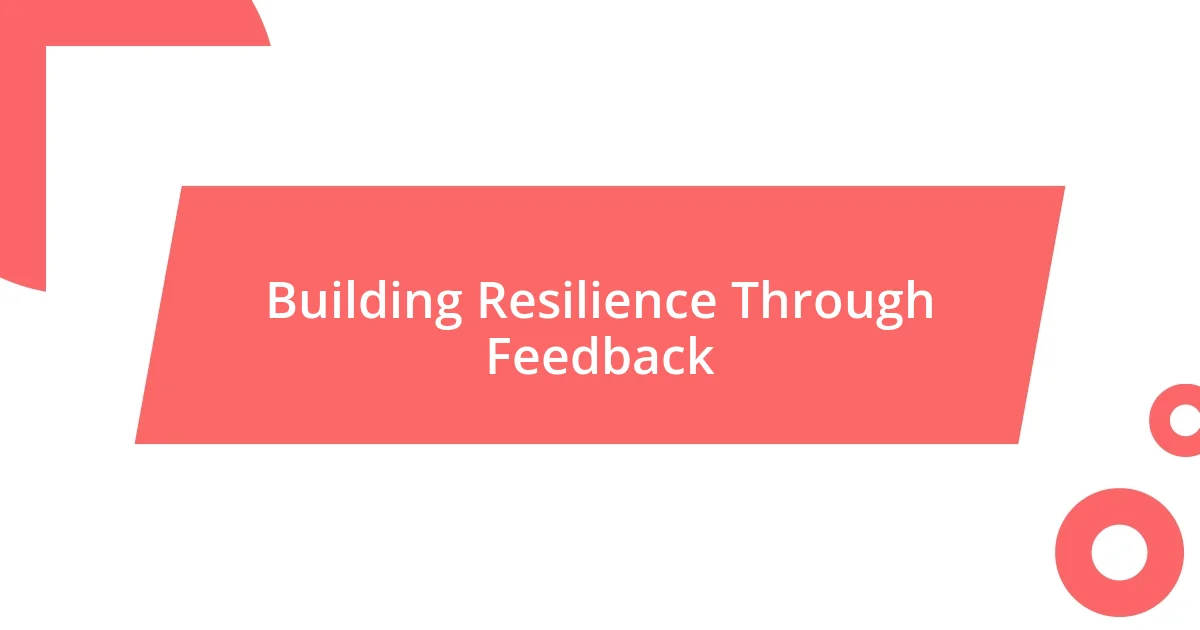
Building Resilience Through Feedback
Building resilience through feedback is essential, and I’ve found that embracing feedback as a learning tool can truly shift my mindset. There was a time when I received a review that stung, almost like a slap in the face. Instead of wallowing in negativity, I chose to examine it closely. What can I learn here? That simple question set me on a path of reflection that fostered resilience.
I often remind myself that every piece of feedback, positive or negative, contributes to my growth. I recall discussing a particularly harsh criticism with a friend over coffee. She suggested viewing it as a puzzle—each critique provides a piece that, when assembled correctly, reveals a clearer picture of my abilities and areas for improvement. Isn’t it intriguing how reframing our thoughts can open up new avenues for growth?
By cultivating this perspective, I’ve begun to see resilience as a muscle that strengthens over time. I remember a moment when I faced multiple critiques in quick succession. Initially, it felt overwhelming. But as I tackled each one, focusing on specific elements I could change, I noticed a newfound confidence emerging. I realized that my capacity to adapt and grow became a source of pride. How liberating it is to know that each review is not just feedback but a stepping stone on the journey of personal growth!



